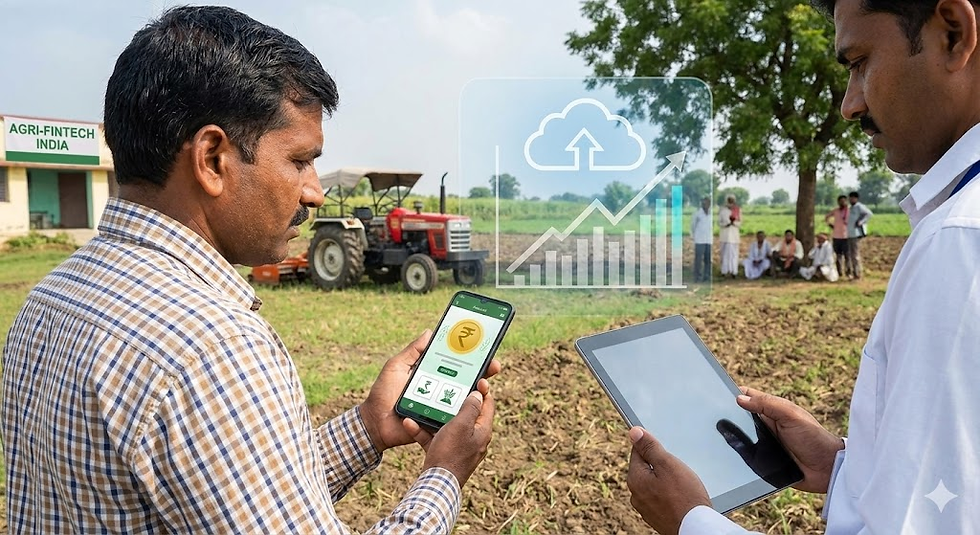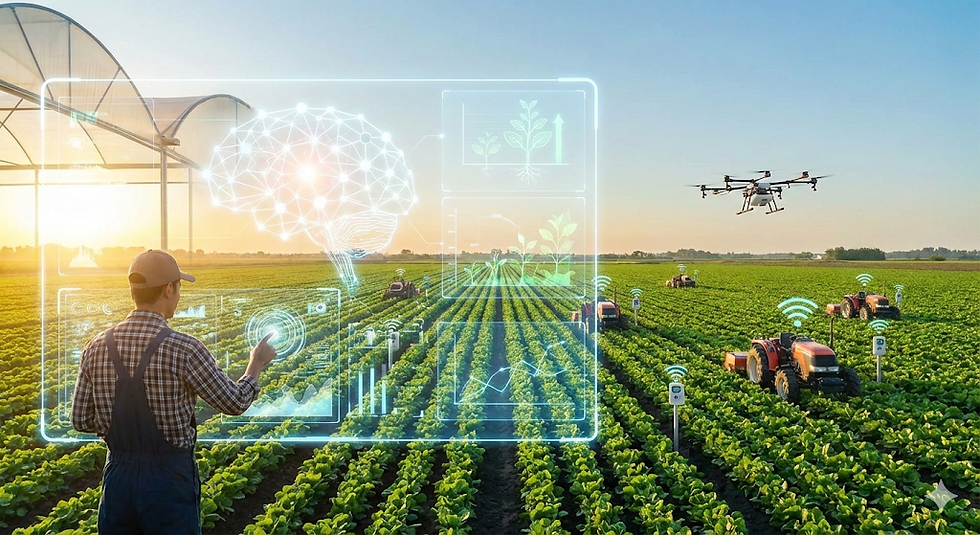Agri-Fintech in India
- Staff Desk
- Mar 28, 2022
- 4 min read
Updated: Jan 9

Agriculture has effectively transitioned from a subsistence effort to a commercial marketplace, resulting in the development of well-developed marketing systems that have not only eliminated the concept of "double coincidence of wants" (barter), but also illustrated the need for an effective exchange system in the form of currency. Thus, even the most rudimentary human endeavor, agriculture, is governed by technology in the twenty-first century, giving access to FinTech to penetrate this industry.
Importance of Agriculture
In the modern world, the word "Agriculture" encompasses a wide range of economic activities from farming to animal husbandry. It has been the backbone of the global economy before the industrial revolution. As indicated by the evolution of economies around the globe, people adopt agriculture first, and the primary sector usually becomes the principal employer.
It is especially critical for India, which ranks second in agricultural output. For around 58 percent of India's population, agriculture is their primary source of income. Agriculture, forestry, and fishery had a Gross Value Added of Rs. 19.48 lakh crore (US$ 276.37 billion) in FY20.
What is Agri-FinTech?
Agri fintech is a new term established in response to the growing relevance of agricultural technology financing. It can be informally defined as the use of technology to improve farm and farmer economics by improving farmer and value chain financing.
Value Chain Farmer financing schemes are loosely characterized as contractual agreements between banks and agricultural value chain operators such as producers, processors, aggregators, and traders, through which a farmer or group of farmers secures the supply of agricultural products to specific businesses.
Agri-FinTech in India
Almost 70% of rural households rely on agriculture for their livelihood. Agriculture contributes significantly to the Indian economy, accounting for approximately 17% of total GDP and employing over 60% of the population.
According to the National Statistical Office's 77th round of the National Sample Survey, the majority of Indian farmers still have no access to the global market and sell their produce in local markets. A tiny percentage of farmers' produce sales goes to Agricultural Produce Market Committees and government agencies.
All these facts pave the way for Agri-Fintech in India and the trend of Agri-FinTech startups in India has exploded in recent years, owing to the size of the market and the fact that everyone stands to benefit.
Agri-Fintech Startups in India
Farm law repeal on November 29, 2021, sparked debate on everything from the possible impact of repeal on small-scale farmers to the government's future reform plans to investor fears about investing in the sector. The new agricultural rules were enacted by the government to connect small-scale farmers to markets to improve the efficiency and transparency of the Indian food supply chain.
With these pressing concerns, the role of Agri-FinTechs in assisting farmers received much-needed attention. Stellapps, Numer8, Aquaconnect, Livestoc, and DGV are among the startups developing solutions to make lending to livestock farmers easier.
Agritechs Entering the Agri-FinTech Landscape
With a combination of smart data intervention, market linkages, partnerships, and a phygital strategy, agritechs like Samunnati and Jai Kisan, as well as NBFCs like Avanti, have proved that lending to farmers, FPOs, and value chain participants can be done at scale.
As a result, dozens of mature and established agritech firms in market linkages, post-harvest, Agri input, and data-centric models, such as those mentioned above, have begun to include financing/credit enabling as part of their core offering. Furthermore, numerous new agrifintech firms have developed, such as Agrifi, Gray Matter Technologies, Arboreum, and IBISA, all attempting to develop their unique models and algorithms in agri-fintech and Agri-Insuretech.
Post-Harvest Agritechs
Arya, Origo, Star Agri, NCML, NBHC, Ergos, and other post-harvest agritech businesses that provide warehousing services were the first to pivot to facilitating finance through partnerships with banks or by establishing their own NBFCs to lend against warehouse receipts.
Almost all of them are in the process of adding a digital layer to their physical infrastructure to digitize the processes of stock arrival, weighing, quality assaying, receipt, and pledge generation to make loan disbursement more efficient without requiring bankers to visit the warehouse physically. As evidenced by firms like Whrrl, warehouse receipt financing is a common use case for blockchain applications.
How big is the Agri-FinTech market?
Given the various white areas and porous borders between vocational and private loans given to farmers, it's tough to put a quantitative estimate on agrifintech market potential. Let me try a little math here.
The Priority Sector Lending's loan to agriculture for the current fiscal year (FY) is $220 billion, with the figure anticipated to rise to $250 billion in the following fiscal year. This covers loans to farmers for asset acquisition and working capital in agriculture and related industries. A portion of these loans is utilized for the farmer's personal purposes, but there is no way of knowing how much of the PSL loan is used for personal purposes by the farmer. Given that just one-third of Indian farmers have access to institutional finance, a total of $750 billion is required to cover all farmers. Assuming that one-third of farmers do not require loans or are not creditworthy, the farmer lending can be scaled back to $500 Billion.
If the untapped opportunity in the post-harvest loan is considered this number jumps to $600 billion. Thus to make full use of this opportunity and to reduce the cost of farmer acquisition, Agri-fintechs should cater to both occupational and personal loan demands of farmers.
Conclusion
It is clear that the agriculture sector of India holds immense growth potential and the Agri-FinTechs can equally benefit from it only if they see the potential it holds and seize the opportunity at the right moment. Visit synlabs.io if you need help navigating the FinTech market or need FinTech solutions for your startup.
SynergyLabs is a cutting-edge technology consulting organization specializing in the development of enterprise-grade solutions for fintech startups, including ready-to-deploy PODs. Founded in 2017, it is a well-funded startup that assists FinTech companies in speeding their growth by delivering robust and scalable solutions. It provides BFSI (Banking, Finance, and Insurance), logistics, retail, and telecommunications services.
If you're a FinTech startup or company looking to develop cutting-edge solutions, send us an email at info@synlabs.io to learn more about what we can do for you.






Comments